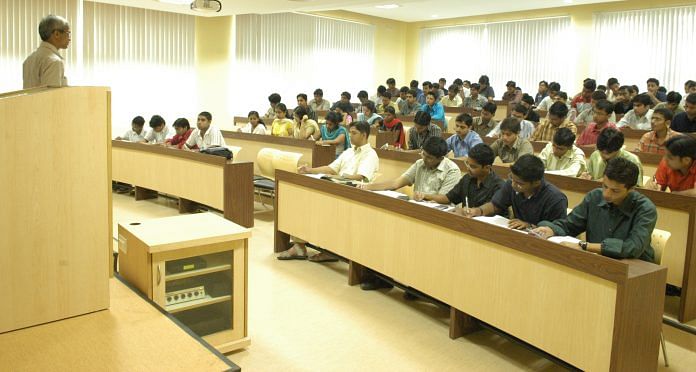The HRD ministry is looking to streamline the working of 18,000 B.Ed colleges, many of which hand out degrees even without attendance.
New Delhi: The Centre’s efforts to weed out ‘poor-quality’ B.Ed colleges, some of which the government says are just fly-by-night operators merely handing out degrees, has hit a legal roadblock — the colleges have in response filed over 270 cases in courts across the country.
As a result, the Human Resource Development (HRD) Ministry’s efforts, to streamline the working of the 18,000 B.Ed colleges in the country, have stalled.
The whole issue has also led to former National Council for Teacher Education (NCTE) chairman, Santosh Mathew, who began the reform process, to take voluntary retirement. A Bihar cadre IAS officer, Mathew left the services in November 2017. He could not be contacted for his comments.
Since his retirement, nothing has moved on this front in the NCTE. The council does not even have a full-time chairperson; Anita Karwal, CBSE chairperson, has been handed additional charge of NCTE.
Cleaning up the system
The Centre began the process to clean up the B.Ed ecosystem in 2017, on the grounds that some of the colleges were producing ‘sub-standard’ teachers.
The NCTE, an autonomous body under the HRD ministry that manages teacher education, revised the accreditation rules for these colleges last year. It included a provision that mandated the colleges to get accreditation from the Quality Council of India (QCI).
The NCTE had also directed the B.Ed colleges to submit affidavits, providing details of their operations in the past few years. The government was looking to initiate action against those colleges that fail to part with the required information. Of the 18,000 colleges, around 5,000 failed to respond.
The NCTE then drew up a list of these colleges and put it up on its website, warning students to check the list before seeking admission to the B.Ed colleges. It found that the maximum number of such colleges were found in Uttar Pradesh and Haryana. The list, however, was withdrawn from public domain after the colleges went to court.
Senior officials in the HRD ministry say the crackdown was primarily aimed at colleges that were handing out degrees to students without them even having to attend classes.
“We cannot act against defaulting colleges now that the matter is sub-judice. We will have to wait for the court’s decision to take any action. The idea was to reform the education system by weeding out colleges that are not performing well,” said a senior official in NCTE.
Fuelling a growing demand
Officials say the growing demand for the course has led to B.Ed colleges mushrooming across the country. As per the central government’s Higher Education Survey, around five lakh students enroll every year for the B.Ed programme, which is mandatory to teach in schools, both private and government.
Secretary (Education), Anil Swarup, who is due to demit office at the end of this month, has been calling the B.Ed colleges the “biggest education mafia” throughout his tenure, on social media and elsewhere.
HRD Minister Prakash Javadekar has also taken serious note of the issue and it was on his insistence that the NCTE revised the accreditation rules.
The legal challenges, however, have put the process on hold. The NCTE has got some relief as the Supreme Court has transferred all of the 270 cases, filed across the country, to the Delhi High Court. A number of cases are now listed for September.
Centre making system more corrupt: Colleges
The colleges say they went to court to resist the government’s attempts to make the system more corrupt.
Those under the Association of NCTE-approved colleges have moved court seeking a stay on the provision to get QCI accreditation. The association claims the QCI has no experience in the sector of education and that it was only set up for industrial purposes. They demand that the process be carried out by the National Assessment and Accreditation Council (NAAC).
S.V. Arya, president of Association of NCTE-approved colleges, told ThePrint, “What we have contested in court is the regulation to give accreditation power to QCI, which has no experience in education sector. Earlier when accreditation happened through NAAC, we at least knew that the people who came for inspection were at the Vice-Chancellors level. They were people who have an idea about the sector but QCI does not have people fit for the job.”
“Government wants to use the same accreditation index for progressive closure of colleges. If a college is up to the mark, it has to get accreditation in five years. The one that does not do well has to do it in two years and the worst ones will be closed. We cannot accept this policy based on accreditation,” he added.




कितने पैसों में बिकता है तुम्हारा यह बार अखबार
क्या फर्ज नहीं बनता किसी एजुकेशन एक्सपर्ट या B.Ed कॉलेज के पास जाकर पूछो कहीं तुम्हारा शोषण तो नहीं हो रहा क्या माननीय हाईकोर्ट का माननीय सुप्रीम कोर्ट के जज बेवकूफ है जो क्वालिटी के नाम पर हो रहे गोरखधंधे को बंद किया है